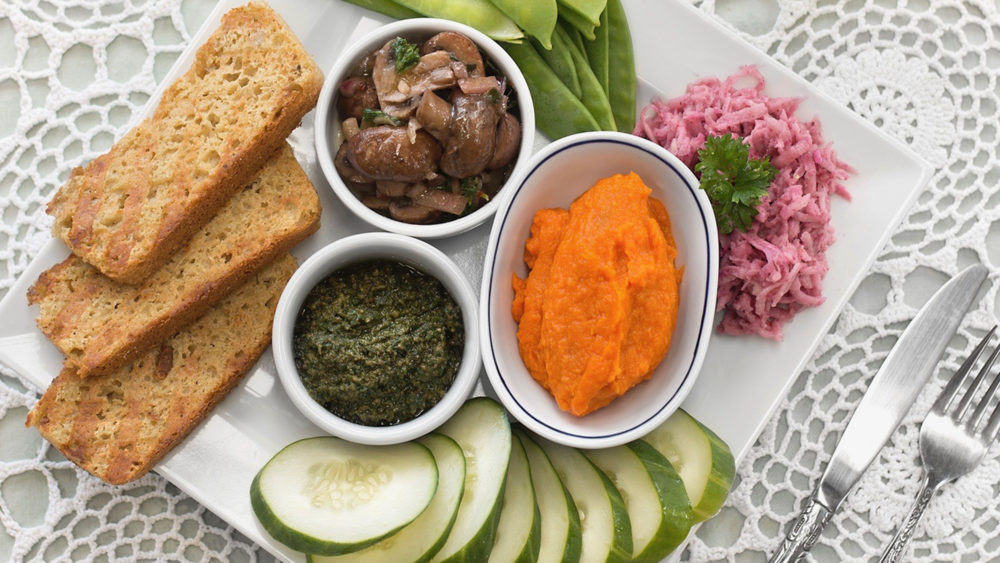By Chanchal Cabrera, MSc, FNIMH, RH(AHG), RHT
Did you know that the herbs and vegetables you can grow in your garden have specific health giving properties? You can grow your own food and you can also grow your own medicine. And if you don’t have a garden or don’t have time to garden, don’t worry — even store bought vegetables and herbs have health giving properties, provided they are fresh and are organically grown.
Preparing garden produce for maximum nutrition
To preserve the precious vitamins and other health giving qualities of these fresh foods, do not keep them more than two to three days. It’s preferable to eat them the day they are picked if you can. Use the culinary herbs as condiments or snip them very fine and add to your salad.
Vegetables in the cabbage family need to be cooked or lightly steamed to inhibit their thyroid-lowering effects. As for other vegetables, nutritionists recommend eating them raw as much as possible (this also includes fruits). Raw vegetables and fruit preserves their enzymes and other key constituents. Take your time and eat slowly. Digestion begins in the mouth and plan fibres take time to break down. By chewing very well, you help speed up the process.
Packing a punch
If you are going to garden or at least to buy foods to eat, go for the vegetables that pack the
most punch, foods that are known to have specific health benefits. It is not hard to choose the garnet yams over white potatoes in the grocery store or growing red cabbage instead of white in your garden. Add in more punch by adding fresh herbs to your dishes. Spike up your next salad dressing, marinade or barbecue sauce with fresh herbs too – you will definitely taste the difference.
Vegetables as medicines
Cabbage and all its cousins (broccoli, Brussels sprouts, kale, mustard greens, bok choy,
radishes, cauliflower and collards) all contain sulphur compounds that promote
detoxification pathways and toxin removal in the liver and aid tissue cleansing.
Garlic, onions, leeks, shallots, green/spring onions and chives all have similar sulphur
compounds and they contribute specifically to anti-microbial effects. Red onions are also
one of the highest known dietary sources of Quercitin, which has anti-inflammatory
properties.
Jerusalem artichokes (sun chokes) are filled with complex sugar molecules called fructo-
oligosaccharides, which provide optimal food to the beneficial bacteria in the bowel.
Used in many cases of chronic colitis or bacterial imbalance in the large intestine.
Dark orange squash such as butternut, kabocha and pumpkin, as well as red and purple
peppers, red cabbage and red onions are all rich in carotenoids and provide a strong anti-
oxidant and immune supporting effect.
Fava (broad) beans have traces of dopamine and can delay the onset of Parkinson’s
disease. People with the disease can eat them daily.
Tomatoes are a great source of Lycopene, a potent flavonoid that has marked anti-cancer
properties.
Fruits as medicines
Pears are used in traditional Chinese medicine as a tonic for the lungs, to soothe irritated
tissue, repair, rejuvenate and nourish the lungs. Blueberries have anthocyanins to
prevent oxidative stress and delay cell aging.
Strawberries and raspberries are rich in gallic acid and its derivatives that inhibit oxidative
stress and delay cell aging.
Figs contain benzaldehydes that are toxic to cancer cells and they also alkalize the body
and reduce inflammation.
Apples and apple juice, especially with the skin on and the pulp retained, have pectin
which is good for the bowel, malic acid which is good for the joints and muscles, sterols in
the skin which regulate the immune system and flavonoids which are anti-oxidant.
Culinary herbs as medicines
Basil has brain stimulating and calming agents that make you more alert, but less anxious.
It can be eaten shredded fresh into salads, omelettes, over fish or pasta.
Rosemary enhances memory, acts as an anti-depressant, stimulates digestive juices,
promotes liver clearance and serves as a powerful anti-oxidant. It is especially good when
eaten with fatty or rich meals.
Sage is used to cool hot flashes and balance hormones, as well as having an anti-
microbial, astringent and tissue healing effects when used as a mouth wash.
Thyme is one of the most powerful antiseptics. The essential oil has antibacterial, anti-
viral, anti-fungal and ant-parasitic properties. It is most effective in the lungs, kidneys and
gut as well as for topical use.
The stems and leaves of anise, dill, fennel, lovage and celery can all be shredded into
salads, soups, omelettes etc. and they promote digestive functions and reduce gas and
bloating
